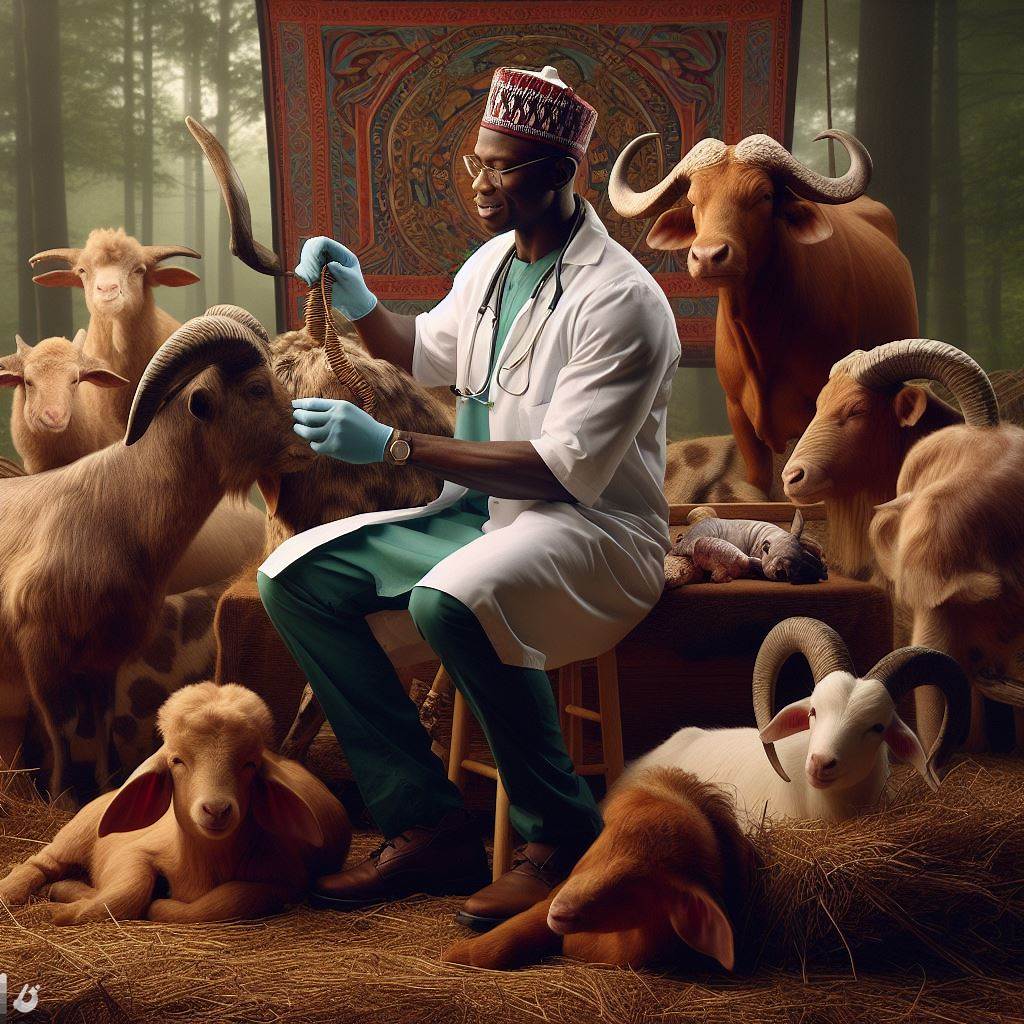Introduction
In Nigeria, postgraduate opportunities in animal nutrition pave the way for impactful contributions to agricultural development.
Understanding the significance of animal nutrition is key to addressing challenges in the country’s livestock sector.
Animal nutrition plays a pivotal role in ensuring the health, productivity, and sustainability of livestock, which are crucial components of Nigeria’s agrarian economy.
With a growing population and increasing demand for protein, there is an urgent need for well-trained professionals in the field of animal nutrition.
This blog post aims to shed light on the postgraduate opportunities available in Nigeria for those passionate about advancing animal nutrition.
By delving into this field, individuals can contribute to enhancing the overall efficiency and profitability of the livestock industry.
The structure of this blog post will unfold in three sections. First, we will explore the importance of animal nutrition in Nigeria’s agricultural landscape.
Then, we will delve into the existing postgraduate opportunities, providing insights into programs, institutions, and eligibility criteria.
Finally, we will discuss the potential impact of pursuing advanced studies in animal nutrition on both individuals and the nation as a whole.
As we navigate through these sections, it is crucial to grasp the integral role animal nutrition plays in shaping the future of agriculture in Nigeria.
The forthcoming sections will serve as a comprehensive guide for those aspiring to make a difference in the lives of livestock and contribute significantly to the nation’s agricultural prosperity.
Overview of Animal Nutrition in Nigeria
The significance of animal nutrition for livestock health, productivity, and profitability
Animal nutrition plays a significant role in ensuring the health, productivity, and profitability of livestock in Nigeria.
Adequate nutrition is essential for animals to reach their full potential and meet the demands of various industries, including meat, dairy, and poultry.
The current challenges and gaps in animal nutrition practices in Nigeria
However, there are several challenges and gaps in animal nutrition practices in Nigeria. Firstly, there is limited access to quality and affordable feed resources, resulting in compromised diets for livestock.
This inadequacy directly impacts their growth, reproduction, and overall performance.
Furthermore, the lack of knowledge and skills in animal nutrition among livestock farmers and professionals exacerbates the problem.
Many individuals in the industry do not possess the specialized knowledge required to formulate balanced diets for different classes of animals.
In order to address these challenges and improve animal nutrition practices in Nigeria, there is a pressing need for specialized knowledge and skills in this field.
Postgraduate opportunities in animal nutrition can contribute towards bridging the existing gaps and equipping professionals with the necessary expertise.
The need for specialized knowledge and skills in this field
There are various reasons why specialized knowledge and skills are crucial in the field of animal nutrition in Nigeria.
Firstly, understanding the nutritional requirements of different types of animals is essential to develop appropriate feeding strategies.
This knowledge ensures that animals receive optimal nutrition to support their growth, reproduction, and immune function.
Moreover, specialized knowledge in animal nutrition enables professionals to formulate cost-effective diets using locally available feed resources.
This reduces the dependency on expensive imported feeds, making livestock farming more sustainable and profitable.
Postgraduate studies in animal nutrition provide individuals with the opportunity to explore cutting-edge research and advancements in the field.
This knowledge can be directly applied to identify and address the specific nutritional challenges faced by livestock in Nigeria, leading to improved health and productivity.
Additionally, specialized skills in animal nutrition can contribute towards the development of innovative feed formulations that enhance animal performance and reduce environmental impacts.
With the growing concern for sustainability, such advancements are crucial for the livestock industry in Nigeria.
In fact, animal nutrition plays a vital role in ensuring the health, productivity, and profitability of livestock in Nigeria.
However, there are significant challenges and gaps in current practices. Postgraduate opportunities in animal nutrition offer a pathway towards filling these gaps and equipping professionals with the specialized knowledge and skills needed to address the existing challenges.
By investing in advanced education and research in this field, Nigeria can improve animal nutrition practices and contribute to the sustainable growth of its livestock industry.
Read: Scholarship Opportunities for Animal Nutrition Students in Nigeria
Available Postgraduate Programs in Animal Nutrition
Overview of universities or institutions in Nigeria offering postgraduate programs in animal nutrition
In Nigeria, numerous institutions open doors for enthusiasts in animal nutrition to elevate their expertise. Ahmadu Bello University, renowned for agricultural sciences, pioneers this educational pursuit.
The specific degrees and certifications available (e.g., Master’s, Ph.D., diploma, etc.)
Master’s and Ph.D. programs in Animal Nutrition empower students with advanced knowledge and research skills. For those seeking a more condensed option, diploma courses are also available.
To embark on this academic journey, candidates must meet specific admission prerequisites. Typically, a bachelor’s degree in a related field is the foundation.
Additionally, a strong passion for advancing animal nutrition science is essential.
Applying to these programs involves a meticulous process. Prospective students need to submit their academic transcripts, letters of recommendation, and a well-crafted statement of purpose.
Demonstrating prior research experience can significantly boost one’s application.
The admission requirements and application process
Some institutions may require candidates to undertake entrance exams, assessing their comprehension of basic animal science concepts.
This step ensures that admitted students possess a solid foundation to excel in the specialized curriculum.
Transform Your Career with Expert Guidance
Get personalized mentorship consulting that’s tailored to your unique path. Our expert advice is actionable and exclusive.
Get StartedThe application timeline is critical. Aspiring postgraduates should keep abreast of the admission cycles of their chosen institutions.
Early preparation is key to meeting deadlines and submitting a comprehensive application package.
Once accepted, students embark on a comprehensive academic journey, delving into topics like animal physiology, feed technology, and nutritional biochemistry.
The programs integrate theoretical knowledge with practical skills, preparing graduates to contribute significantly to the field.
In short, pursuing postgraduate programs in animal nutrition in Nigeria offers a gateway to expertise and innovation.
Aspiring scholars can shape the future of livestock management, ensuring sustainable practices and improved animal well-being.
Curriculum and Specialization Areas
Postgraduate programs in animal nutrition in Nigeria offer a comprehensive curriculum that equips students with the necessary knowledge and skills to excel in this field.
The curriculum consists of core courses and specialized areas of study to ensure a well-rounded education.
Overview of the Curriculum
The curriculum of postgraduate programs in animal nutrition typically includes a combination of coursework, research, and practical experiences.
Students are required to complete a certain number of credit hours to obtain their postgraduate degree.
The core courses are designed to provide students with a solid foundation in animal nutrition.
These courses cover topics such as animal physiology, feed formulation, nutrient metabolism, and feed evaluation. Students will also study concepts related to animal production and management.
Specialized Areas of Study
Within the field of animal nutrition, students have the opportunity to specialize in specific areas based on their interests and career goals. Some of the specialized areas of study include:
- Ruminant Nutrition: This specialization focuses on the nutritional requirements and feeding strategies for ruminant animals such as cattle, sheep, and goats. Students will learn about the unique digestive system of ruminants and develop expertise in formulating diets for optimal performance.
- Poultry Nutrition: Poultry nutrition is a specialized area that delves into the nutritional needs of poultry species, including chickens, turkeys, and ducks. Students will learn about the unique requirements of different poultry species and study topics such as feed additives, feed milling, and poultry feed formulation.
- Swine Nutrition: Swine nutrition focuses on the nutritional requirements of pigs. Students will gain knowledge in formulating diets that promote growth, reproductive efficiency, and overall health in pigs. They will also explore feed management strategies for swine production systems.
- Aquaculture Nutrition: This specialization focuses on the nutrition of aquatic organisms, such as fish and shrimp, which are reared in aquaculture systems. Students will learn about the specific nutritional requirements of different aquatic species and study topics such as fish feed formulation, feed technology, and feed quality assessment.
Research Opportunities and Practical Experiences
Postgraduate programs in animal nutrition in Nigeria provide ample research opportunities and practical experiences to enhance students’ understanding of the subject matter. These opportunities may include:
- Research Projects: Students are often required to conduct independent research projects as part of their postgraduate studies. These projects allow students to apply the knowledge they have gained and contribute to the existing body of research in animal nutrition.
- Laboratory Work: Practical laboratory work is an integral component of postgraduate programs in animal nutrition. Students will have the opportunity to gain hands-on experience in sample analysis, feed formulation, and feed quality assessment.
- Field Visits: Some programs may include field visits to livestock farms, feed mills, or research institutions. These visits provide students with real-world exposure to animal nutrition practices and allow them to observe and learn from industry professionals.
- Internships: Certain postgraduate programs may offer internship opportunities where students can gain practical experience by working in industry or research settings. This allows students to apply their theoretical knowledge in a professional context and develop valuable skills.
Overall, the curriculum of postgraduate programs in animal nutrition in Nigeria focuses on providing students with a strong foundation in the field and offering specialization options to suit their interests.
The inclusion of research opportunities and practical experiences further enhances students’ learning and prepares them for successful careers in animal nutrition.
Read: Introduction to Animal Breeding & Genetics in Nigeria’s Universities

Career Opportunities in Animal Nutrition
In this section, we will outline the potential career paths and job prospects for graduates with a postgraduate degree in animal nutrition.
We will also discuss the demand for professionals in this field within Nigeria’s agriculture and livestock industry, and highlight the potential roles in academia, research institutions, government agencies, and private companies.
Potential Career Paths and Job Prospects
- Animal Nutrition Consultant: Assisting farmers in optimizing animal diets for better health and productivity.
- Nutrition Research Scientist: Conducting studies and experiments to develop new animal feed formulations.
- Feed Mill Manager: Overseeing the production and quality control of animal feed in a manufacturing facility.
- Livestock Production Manager: Managing the nutritional needs of livestock to improve their overall performance.
- Animal Nutritionist in the Pharmaceutical Industry: Developing specialized feed products for livestock health and disease prevention.
Demand for Professionals in Animal Nutrition
Nigeria’s agriculture and livestock industry is growing rapidly, creating a high demand for professionals in animal nutrition.
With the government’s focus on boosting food production and improving livestock quality, the need for skilled individuals in this field continues to increase.
The rising population and changing consumption patterns have led to a greater demand for animal products, such as meat, milk, and eggs.
To meet these demands sustainably, there is a need for professionals who can optimize animal nutrition and ensure efficient and healthy livestock production.
Potential Roles in Various Sectors
- Academia: Graduates with a postgraduate degree in animal nutrition can have promising careers as lecturers or researchers in universities or colleges. They can contribute to the development of new knowledge in the field and mentor future professionals.
- Research Institutions: Animal nutritionists can work in research institutions, collaborating on studies to improve animal feed composition, enhance animal performance, and find innovative solutions to nutrition-related challenges in the livestock industry.
- Government Agencies: The government plays a crucial role in regulating and developing the agriculture sector. Animal nutrition experts can contribute to policymaking, implementing programs, and providing technical expertise to improve livestock nutrition and welfare.
- Private Companies: Many private companies, including feed manufacturers, pharmaceutical companies, and livestock production firms, require professionals in animal nutrition. Graduates can work in product development, quality control, sales, and technical advisory roles.
In essence, pursuing a postgraduate degree in animal nutrition opens up numerous career opportunities in Nigeria.
The agriculture and livestock industry’s growth, combined with the need for sustainable and efficient animal production, increases the demand for skilled professionals in this field.
Whether in academia, research institutions, government agencies, or private companies, graduates can contribute to the development, research, and implementation of animal nutrition solutions to support the country’s agricultural development.
Read: Agronomy Internships: Top Opportunities in Nigeria Today
Scholarships and Funding Opportunities
In the pursuit of postgraduate studies in animal nutrition in Nigeria, aspiring scholars often grapple with the financial challenges associated with advanced education.
This section sheds light on vital scholarships and funding opportunities tailored for those venturing into the realm of animal nutrition.
Information on available scholarships, grants, and funding opportunities specifically for postgraduate students in animal nutrition
Understanding the financial landscape is crucial for prospective postgraduates. Various scholarships and grants exist to alleviate the financial burden and facilitate a smooth academic journey.
These opportunities serve as beacons for talented minds seeking to contribute to the advancement of animal nutrition in Nigeria.
Eligibility criteria, application process, and deadlines for these opportunities
Aspiring scholars should be aware of eligibility criteria to align their aspirations with the specific requirements of each funding opportunity.
From academic achievements to research interests, each criterion reflects the essence of fostering excellence in the field.
Thus, applicants must meticulously assess their qualifications against these criteria to enhance their chances of securing financial support.
Navigating the application process can be challenging, but this section serves as a guide. It delineates the steps involved, ensuring that potential beneficiaries comprehend the intricacies of each application.
Timely submission is paramount, and understanding deadlines is pivotal for a successful application process.
The importance of considering financial support when planning to pursue postgraduate studies in this field
Highlighting the importance of financial support, this section underscores its role in enabling scholars to fully immerse themselves in their studies.
It emphasizes that financial stability contributes to a conducive academic environment, allowing postgraduates to focus on groundbreaking research and innovations in animal nutrition.
Basically, this section serves as a compass, directing aspiring postgraduates toward financial avenues that pave the way for academic success.
By exploring scholarships and funding opportunities, scholars can embark on their postgraduate journey with confidence, knowing that financial support is within reach.
Read: Student Experiences: Life as an Animal Nutrition Major in Nigeria
Advice for Prospective Students
Considering postgraduate studies in animal nutrition in Nigeria? Here are some tips and advice to help you make the most of your academic journey:
Gain Practical Experience
- Take advantage of internships or volunteer opportunities to gain hands-on experience in the field.
- Practical experience will enhance your theoretical knowledge and make you more marketable in the industry.
- Seek opportunities to work with animals, participate in research projects, or collaborate with industry professionals.
Network Within the Industry
- Attend conferences, workshops, and seminars related to animal nutrition to connect with experts and professionals.
- Join relevant professional organizations and associations to expand your network and access job opportunities.
- Engage with industry leaders and fellow students to exchange ideas, gain insights, and form valuable connections.
Conduct In-depth Research
- Explore various universities or institutions in Nigeria that offer postgraduate programs in animal nutrition.
- Consider factors such as program curriculum, faculty expertise, research facilities, and industry collaborations.
- Read scientific papers, research articles, and publications to enhance your knowledge in specific areas of animal nutrition.
Seek Mentorship
- Reach out to professors, researchers, or professionals in the field and request mentorship.
- Mentors can provide guidance, support, and valuable advice throughout your postgraduate studies.
- They can also assist in identifying research opportunities, internships, or potential job placements.
Be Proactive in Research and Publication
- Participate in research projects during your postgraduate studies to contribute to the field of animal nutrition.
- Seek opportunities to publish your work in scientific journals or present it at conferences.
- This will enhance your academic profile, increase your chances of scholarships, and attract potential employers.
Stay Updated with Industry Trends
- Regularly read industry magazines and online publications to stay informed about the latest advancements and trends.
- Subscribe to newsletters or follow relevant social media accounts for updates in animal nutrition research and practices.
- Continuously learning and adapting to new knowledge will help you remain competitive in the field.
Be Open to Collaboration and Entrepreneurship
- Consider collaborating with researchers, professionals, or organizations to expand your knowledge and opportunities.
- Explore entrepreneurial ventures by starting your own consultancy or research-based business in animal nutrition.
- Embrace innovation and identify gaps or challenges in the industry that you can address with your expertise.
Embarking on postgraduate studies in animal nutrition in Nigeria can be a rewarding and fulfilling experience.
By gaining practical experience, networking, conducting research, seeking mentorship, and staying updated with industry trends, you can position yourself for success in this field.
Remember, passion, dedication, and continuous learning are the keys to unlocking opportunities and making meaningful contributions to the industry.
Conclusion
In wrapping up our exploration of postgraduate opportunities in animal nutrition in Nigeria, let’s recap the key insights.
We’ve delved into the critical role of nutrition in enhancing livestock health and boosting agricultural productivity.
Highlighting the significance of this field, we emphasized its pivotal role in addressing food security challenges and fostering sustainable agricultural practices in Nigeria.
The various postgraduate programs available in the country equip students with the knowledge and skills needed to make a meaningful impact in this crucial sector.
As we conclude, it’s essential to reiterate the profound importance of animal nutrition in the broader context of Nigeria’s agricultural landscape.
Proper nutrition not only ensures the well-being of livestock but also directly contributes to the overall economic growth of the nation.
Considering the available postgraduate opportunities, aspiring individuals are presented with a pathway to specialize and deepen their understanding of animal nutrition.
These programs provide a platform for research, innovation, and the development of sustainable practices in livestock management.
In encouraging our readers, we extend an invitation to contemplate pursuing further education in animal nutrition.
By doing so, individuals can actively contribute to the growth and development of Nigeria’s agriculture industry.
Each educated professional in this field becomes a catalyst for positive change, driving advancements that ripple through the entire agricultural ecosystem.
In essence, the decision to pursue postgraduate studies in animal nutrition is not merely a personal choice; it’s a commitment to the collective prosperity of Nigeria.
As we envision a future where agriculture thrives, let us recognize the transformative power of education in shaping the landscape of animal nutrition and, consequently, the nation’s agricultural destiny.




